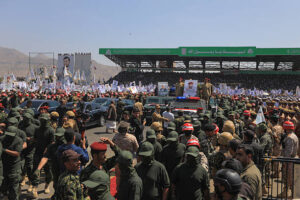When Syrian rebel leader Ahmed al-Sharaa arrived in Damascus and gave a victory speech on the heels of a lightning military campaign that swept through the country and toppled Bashar al-Assad’s regime, one remark went widely unnoticed. That was his reference to an illegal narcotic that has flooded the Middle East over the past ten years.
“Syria has become the biggest producer of Captagon on earth,” he said. “And today, Syria is going to be purified by the grace of God.”
Mostly unknown outside of the Middle East, Captagon is an addictive, amphetamine-like pill, sometimes called “poor man’s cocaine”.
Its production has proliferated in Syria amid an economy broken by war, sanctions and the mass displacement of Syrians abroad. Authorities in neighbouring countries have struggled to cope with the smuggling of huge quantities of pills across their borders.
All the evidence pointed to Syria being the main source of Captogan’s illicit trade with an annual value placed at $5.6bn (£4.5bn) by the World Bank.
At the scale that the pills were being produced and dispatched, the suspicion was that this was not simply the work of criminal gangs – but of an industry orchestrated by the regime itself.
Weeks on from the speech by al-Sharaa (previously known by his nom de guerre of Abu Mohammed al-Jolani), spectacular images have emerged that suggest the suspicion was correct.
Videos filmed by Syrians raiding properties allegedly owned by relatives of Assad show rooms full of pills being made and packaged, hidden in fake industrial products.
Other footage shows piles of pills found in what appears to be a Syrian military airbase, set on fire by the rebels.
I spent a year investigating Captagon for a BBC World Service documentary and saw how the drug became as popular among the wealthy youth of Gulf countries like Saudi Arabia as it was among the working class in countries like Jordan.
“I was 19 years old, I started taking Captagon and my life started to fall apart,” Yasser, a young male addict in a rehab clinic told us in Jordan’s capital, Amman. “I started hanging out with people who take this thing. You work, you live without food, so the body is a wreck.”
So how will al-Sharaa and his group, Hayat Tahrir al-Sham (HTS), deal with the large number of people in Syria and around the Middle East addicted to Captagon who may suddenly find themselves without a supply?
Caroline Rose, an expert on Syrian drug trafficking at the New Lines Institute, has concerns around this. “My fear is that they will really crack down on supply and not necessarily try to do any sort of demand reduction.”
But there is a broader question at play too: that is, what effect will the loss of such a lucrative trade have on Syria’s economy? And as those behind it move aside, how will al-Sharaa keep at bay any other criminals waiting in the wings to replace them?




